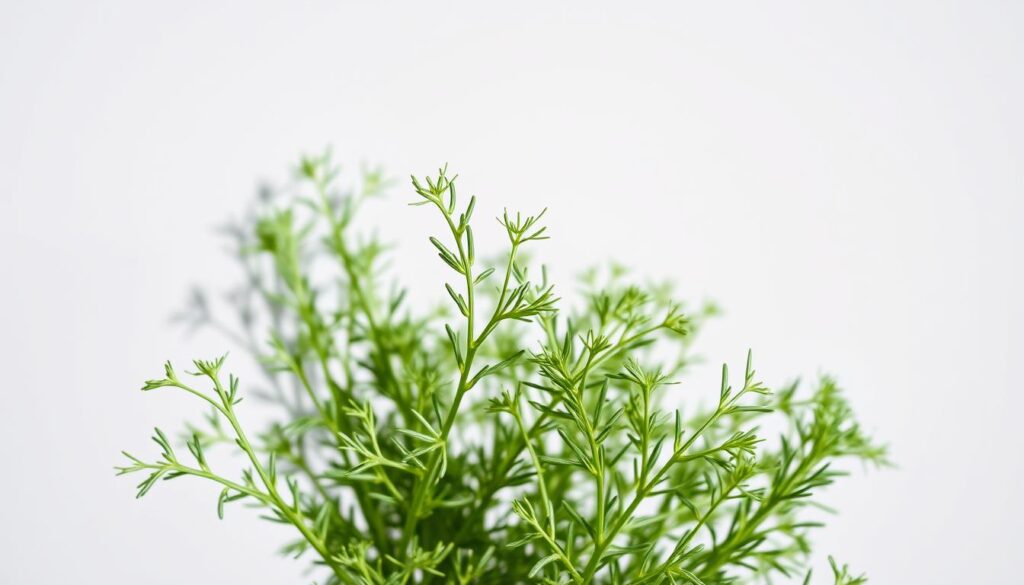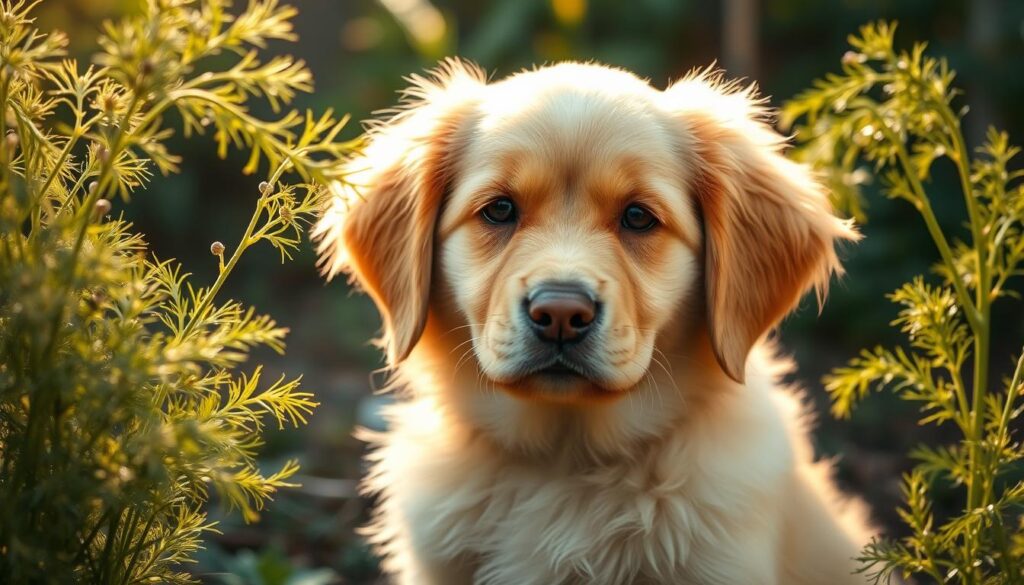Table of Contents
can dogs have dill
Every pet owner wants the best for their furry friend. When I found out about dill’s benefits for dogs, I was both excited and careful. Can dogs safely eat dill? The answer might surprise you.
Dill is more than a tasty garnish. It can offer health benefits for your dog. Veterinary nutritionists say dill can be good for dogs in small amounts.
It’s important to know how to add new herbs to your pet’s diet. While dill is usually safe, the right way to add it is key for your dog’s health.
Key Takeaways
- Dill is generally safe for dogs in small quantities
- The herb offers potential digestive and antioxidant benefits
- Always introduce new foods gradually
- Consult with your veterinarian before making dietary changes
- Moderation is key when feeding herbs to dogs
Understanding Dill and Its Nutritional Value
Dill weed is more than a kitchen spice for dogs. It’s packed with nutrients that can boost your dog’s health in many ways.
Dill has a long history in cooking and medicine. It’s important for dog owners to know its nutritional benefits and how it can help their pets.
What is Dill?
Dill comes from the Mediterranean and belongs to the celery family. It has feathery leaves with a unique taste. The whole plant, from seeds to leaves, is full of nutrients.
Nutritional Components of Dill
- Rich in Vitamin A for eye health
- Contains Vitamin C to boost immune system
- Provides essential minerals like:
- Manganese
- Iron
- Calcium
Potential Health Benefits for Dogs
Dill can be good for dogs. It may help with digestion and ease minor discomforts.
Natural herbs can be a wonderful supplement to your dog’s diet when used appropriately and in moderation.
Start with small amounts of dill to see how your dog reacts. Every dog is different, so what works for one might not work for another.
Safety of Dill for Dogs
Many pet owners are curious about the safety of fresh dill for their dogs. They want to know if it’s okay to add this herb to their dog’s diet. This is especially true for those who want to use natural ingredients.
The good news is that dill can be safe for dogs if used right. Not all herbs are the same. Knowing how to use dill safely is key for your dog’s health.
Is Dill Toxic to Dogs?
Dill is usually safe for dogs and can be a good addition to their meals. Here are some important things to remember:
- Small amounts of fresh or dried dill are typically safe
- Organic, fresh dill is better than processed seasonings
- Always introduce new herbs slowly into your dog’s diet
Signs of Dill Allergy in Pets
Even though rare, some dogs might have an allergic reaction to dill. Look out for these signs:
- Digestive upset – vomiting or diarrhea
- Unusual skin irritations
- Changes in appetite
- Respiratory difficulties
Pet owners should always consult with a veterinarian before making significant changes to their dog’s diet.
When it comes to dill seasoning and pet safety, be careful. Start with a tiny amount and watch your dog closely. If you see any bad signs, stop using it right away and talk to your vet.
Benefits of Dill for Dogs
Dill is more than just a tasty flavor for dogs. It offers many health benefits that can improve your dog’s overall well-being. Knowing the benefits of dill for dogs can help you choose the best food for them.
Antioxidant Powerhouse
Dill is packed with antioxidants that protect your dog’s cells from harm. These natural compounds help:
- Keep cells healthy
- Boost the immune system
- Lessen inflammation
Digestive Health Support
Dill is great for your dog’s digestive system. It can help with:
- Reducing gas and bloating
- Sothing mild stomach issues
- Encouraging healthy digestion
Antimicrobial Protection
Dill has natural antimicrobial properties that fight off bad bacteria. Its essential oils may boost your dog’s defense against infections.
Natural herbs like dill can be a gentle way to support your dog’s health when used appropriately.
Always introduce new herbs slowly and talk to your vet first. This ensures it’s right for your dog’s diet.
How to Introduce Dill to Your Dog’s Diet
Exploring new ways to make your dog’s meals better can be fun. If you’re wondering if dogs can have dill, there are safe ways to add it to their food. It’s important to do it right for your dog’s health and happiness.

Vets say to introduce new foods slowly to your dog’s diet. Dill can be good for them, but only in small amounts.
Fresh Dill vs. Dried Dill
When thinking about dill pickles and dogs, know the difference between fresh and dried dill:
- Fresh Dill: More powerful and full of nutrients
- Dried Dill: Easier to store and less flavorful
“Always choose plain dill without added seasonings or salt for your dog’s safety.” – Veterinary Nutrition Expert
Recommended Serving Sizes
The right amount of dill for your dog depends on their size and health. Here’s a basic guide:
- Small dogs: 1/4 teaspoon of fresh or dried dill
- Medium dogs: 1/2 teaspoon of dill
- Large dogs: Up to 1 teaspoon of dill
Dill pickles are not good for dogs because of too much salt and harmful additives. Use fresh or dried dill instead to make their meals better.
Preparing Dill for Your Dog
Adding dill weed to your dog’s diet can be a great way to improve their nutrition. As a pet owner, you might be curious about how to safely add this herb to their meals. It’s important to know how to prepare dill to make sure it’s safe and tasty for your dog.
When thinking about whether dill is safe for dogs, preparation is essential. Here are some easy ways to add dill to your dog’s meals:
- Sprinkle dried dill lightly over regular kibble
- Chop fresh dill into small pieces
- Mix finely chopped dill into homemade dog food
- Create dill-infused dog treats
Homemade Dill Dog Treat Recipe
Try this simple and healthy dill dog treat recipe that adds the herb safely:
- 1 cup whole wheat flour
- 1/2 cup plain yogurt
- 2 tablespoons fresh dill, finely chopped
- 1 egg
Mix the ingredients, roll out the dough, cut into shapes, and bake at 350°F for 15 minutes. Always introduce new foods slowly and in small amounts to watch how your dog reacts.
“Moderation is crucial when adding any new ingredient to your dog’s diet” – Veterinary Nutritionists
Dill weed can offer some health benefits for dogs when used correctly. Always talk to your vet before making big changes to your dog’s diet.
Other Safe Herbs for Dogs
Exploring herbal options for your furry friend is exciting. Dogs eating dill is just the start. There are many herbs that can boost your dog’s health.

Adding herbs to your dog’s diet can be very beneficial. Not all herbs are good for dogs, but some are very helpful.
Exploring Safe Herbal Options
Here are some great herbs for your dog’s health:
- Basil: Supports digestive health and reduces inflammation
- Parsley: Helps with bad breath and provides essential vitamins
- Cilantro: Supports detoxification and offers antioxidant properties
- Thyme: Provides antimicrobial benefits and supports respiratory health
Benefits of Herbal Additions
When adding herbs to your dog’s diet, remember to do it in moderation. Each herb has its own benefits that can add to your pet’s nutrition. Fresh herbs are usually more potent and better than dried ones.
Always consult with your veterinarian before making significant changes to your dog’s diet.
Introducing herbs like dill to your dog’s diet should be done with care. Start with small amounts and watch how your pet reacts. The aim is to improve their diet, not replace it.
Potential Risks of Feeding Dill
Dill seasoning is usually safe for pets, but there are risks. It’s good for dogs, but you must use it carefully. This prevents health problems.
Medication Interactions
Dill can affect some medicines. Dogs on certain drugs might react badly. Be aware of these risks:
- Blood thinning medications
- Diabetes management drugs
- Hormone regulation treatments
Overconsumption Symptoms
Too much dill can upset your dog’s stomach. Look out for these signs:
- Mild stomach upset
- Decreased appetite
- Unusual lethargy
- Potential allergic reactions
Always talk to your vet before adding new herbs to your dog’s diet, especially if they have health issues.
Use dill in small amounts to keep your dog safe. Watch how they react to this herb.
Understanding Your Dog’s Dietary Needs
Understanding your dog’s diet is key. It’s important to plan carefully to ensure they get the right food. This helps keep them healthy and happy.
A balanced diet is the foundation of your dog’s health. While dill can be good, it can’t replace all the nutrients they need. It’s important to know how to add supplements safely.
Importance of a Balanced Diet
Dogs have complex nutritional needs. When thinking about dill for dogs, remember it’s meant to add, not replace, important nutrients. A good diet includes:
- High-quality protein sources
- Essential fatty acids
- Complex carbohydrates
- Vitamins and minerals
- Appropriate caloric intake
Consult Your Veterinarian
Always talk to a vet before adding new foods, like dill, to your dog’s diet. They can give advice based on:
- Your dog’s age
- Breed-specific nutritional needs
- Current health status
- Potential medication interactions
“Every dog is unique, and nutrition should be tailored to individual needs.” – Veterinary Nutrition Expert
Getting advice from a vet ensures your dog gets the best nutrition. This includes safely trying herbal supplements like dill.
User Experiences with Dill in Dog Diets
Pet owners have shared interesting stories about adding dill to their dogs’ food. They’ve found both benefits and things to watch out for when using this herb.
Many pet owners have shared their experiences with dill. Their stories show both good and bad sides of using dill for dogs.
Positive Testimonials from Dog Owners
- Improved digestive health after introducing small dill quantities
- Noticeable breath freshness in dogs consuming dill
- Enhanced meal palatability with fresh dill garnish
However, some owners found that dill pickles aren’t always good for dogs. Experts say to use fresh dill instead. This is because pickles have too much salt and other bad stuff.
Cautions from Experienced Pet Parents
| Observation | Potential Concern |
|---|---|
| Allergic Reactions | Watch for itching or digestive upset |
| Portion Control | Limit dill to small amounts |
| Individual Sensitivity | Each dog may react differently |
When thinking about dill for dogs, talking to a vet is key. Every dog is different, so getting advice tailored to your pet is important.
Always introduce new herbs gradually and monitor your dog’s response carefully.
These stories are helpful, but don’t forget to get your vet’s opinion. Your dog’s health needs should always come first when changing their diet.
Conclusion: Integrating Dill Confidently
Exploring dill weed for canines can be an exciting journey for pet owners. They seek to enhance their dog’s nutrition. Dogs eating dill can potentially benefit from this aromatic herb when introduced carefully and thoughtfully.
Navigating the world of herbal supplements for your furry friend requires careful consideration. Professional guidance is key. Your veterinarian remains the most reliable resource for personalized dietary advice.
Final Thoughts on Canine Herb Integration
When considering dill for your dog’s diet, remember these key guidelines:
- Start with small quantities
- Observe your dog’s reaction
- Consult your veterinarian before making significant dietary changes
- Choose fresh, organic dill when possible
Encouraging Herbal Exploration
Pet owners can confidently experiment with herbs like dill by following simple precautions. The potential health benefits make exploring natural supplements worthwhile.
| Herb | Potential Benefits | Recommended Caution |
|---|---|---|
| Dill | Digestive support | Moderate portions |
| Parsley | Breath freshener | Small amounts |
| Basil | Anti-inflammatory | Veterinary approval |
Remember, every dog is unique. What works for one might not work for another. Approach herbal supplementation with patience, observation, and professional guidance.
Resources for Further Information
Learning more about fresh dill and dogs is important. Veterinary experts suggest checking out reliable sources. They recommend professional journals, academic books, and vet websites for in-depth info.
The American Veterinary Medical Association (AVMA) has great guides on pet nutrition. These guides help you understand how to safely add herbs like dill to your dog’s food. Books by vet nutritionists also offer detailed advice on safe herb use and dietary needs for dogs of all ages and health levels.
Online, the American Kennel Club (AKC) website and vet nutrition blogs share the latest research and tips. But, always remember to talk to your local vet. They know your dog’s health and nutritional needs best.
Learning about canine nutrition is an ongoing process. Look for vet seminars, nutrition workshops, and online courses. Each resource you find will make you a better pet owner. This way, you can ensure your dog gets the best food for their health.
FAQ
Is dill safe for dogs to eat?
Yes, dill is safe for dogs in small amounts. It’s non-toxic and can be good for them. But, introduce it slowly and in small amounts.
How much dill can I give my dog?
Give your dog about 1/4 to 1/2 teaspoon of fresh or dried dill. Remember, a little goes a long way. Too much can upset their stomach.
What are the health benefits of dill for dogs?
Dill has many benefits. It’s full of antioxidants, helps with digestion, and might fight off infections. It also has vitamins and minerals that are good for dogs.
Can dogs eat dill pickles?
No, dogs should not eat dill pickles. Dill is safe, but pickles have too much salt and other harmful stuff. The salt can poison dogs.
Are there any signs of dill allergy in dogs?
Look out for vomiting, diarrhea, scratching, or being very tired after eating dill. If you see these signs, stop giving dill and talk to your vet.
Can I use fresh or dried dill for my dog?
Both fresh and dried dill are okay for dogs. Fresh might be more nutritious, but dried is easier to use. Always pick organic and make sure it’s plain.
Should I consult my vet before giving my dog dill?
Yes, always talk to your vet before adding new foods to your dog’s diet. This is very important if your dog has health problems or is on medicine.
Can dill help with my dog’s digestion?
Dill might help with digestion by reducing gas and bloating. It can soothe the stomach. But, it’s not a replacement for vet care for serious issues.
There are no reviews yet. Be the first one to write one.

